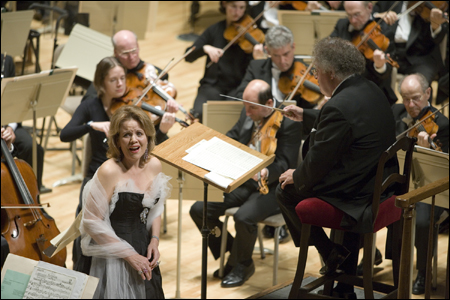
STAR POWER: Renée Fleming grew less operatic as she warmed to Knoxville: Summer of 1915, and James Levine surrounded her with palpable atmospere. |
An elderly, well-dressed Boston Symphony Orchestra patron remarked to a friend after the gala “Opening Night at Symphony” last Friday that though she’d enjoyed the concert, she would have liked something “moah.” Given the history of BSO opening nights (James Levine began his residency as BSO music director with Mahler’s monumental Eighth Symphony), the long evening was not exactly long on substance. At times, this “American” program, led by the BSO’s first American music director, bordered on being a Pops concert, designed to make the higher ticket prices easier to swallow.
There were not just one but two superstars: Irish virtuoso Sir James Galway (the “man with the golden flute”) and soprano Renée Fleming, the reigning American diva, a combination that accounts for some of the program’s oddity. Fleming, in a black and white gown whose bodice seemed to be overflowing with cotton candy, led off with a familiar work one would have thought perfect for her, Samuel Barber’s Knoxville: Summer of 1915, a piece premiered by the BSO under Serge Koussevitzky in 1948, with the great American soprano Eleanor Steber, who “commissioned” it after it was composed. Since then, it’s been performed mainly at Tanglewood; its only other BSO subscription-concert appearance was in 1996.
Knoxville is Barber’s setting of James Agee’s piercing reminiscence of his childhood just before his father died (it was later inserted as the prologue to his posthumously published Pulitzer Prize-winning novel, A Death in the Family); Barber dedicated the piece to his own father’s memory. Intimate and poetic, it requires a singer — like Steber — who can convey a sense of intimacy, reminiscing and confiding, thinking aloud, discovering meaning as the piece proceeds. (“All my people are larger bodies than mine . . . with voices gentle and meaningless like the voices of sleeping birds. . . . One is my mother who is good to me. One is my father who is good to me.”) Fleming’s voice, unlike Steber’s, tends to surround words rather than fill them. Early in the piece, the delicious way she tasted the word “strawberry” only underlined how little she was coloring other words. As she warmed into the piece, she got less operatic, less grand, and the music seemed to become less simply a vehicle for her glamorous voice. It stayed in my head all night.
This was Levine’s first professional performance of the Barber, and he surrounded Fleming with palpable atmosphere — the dreamy summer evening out on the lawn, the interruption of a “stertorous” streetcar, and, more subtly, the ominous foreshadowings of mortality embodied in the beautiful wind playing from oboist John Ferrillo and clarinettist William R. Hudgins.